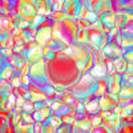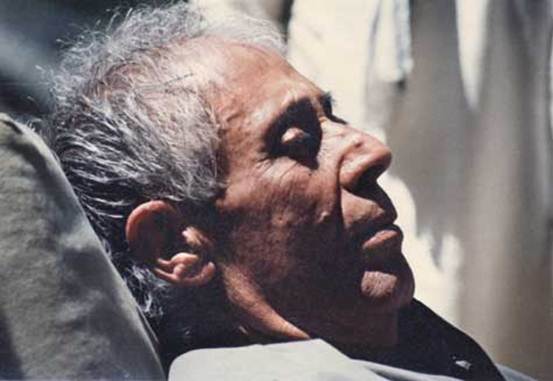
Shiva Sutras 3.32 & 3.33
-
The God-within is unchanged, untouched, and unaffected by any act or thought.
Shiva Sutra 3.32
tat pravritavapyanirasah samvettribhavat
The enlightened yogi feels that this “entire universe is the expansion of his
own glory. [SLJ]” Having entered into God consciousness and Become immersed in
his true nature, the Oneness, the yogi experiences the powers of creation,
protection, and destruction. These three metaphysical forces characterize the
functions of the Oneness, which in Kashmir Shaivism is named BHAIRAVA.
The Sanskrit word
Bhairava is a composite of BHA, meaning the maintenance and protection of
the world; RA - the destruction and withdrawal of the world; VA – the creation
or projection of the world. Those who have achieved entry into God consciousness
feel expanded into these three omnipotent metaphysical principles.
The yogi experiences and expands his own awareness into these three universal
powers, but he is not changed by their fluctuations. The enlightened are
appeased, nestled in the Heart of their own Self. For “him the reality of the
Self remains…This yogi is never separated from the state of the Knower…the bliss
of TURYA. [SLJ]” The truly enlightened remain in Bliss.
The state of the ‘Knower’ implies that his consciousness is never again lost in
the external world of objects. As the Knower he is beyond these three states of
creation, protection, and destruction. He is not altered by the recurring cycles
of these three metaphysical forces. The happy implication of this understanding
is the enlightened yogi is not affected and destroyed when the world is
dissolved in any cyclical Dissolution.
“There is no creation and there is no destruction of that Self (the yogi).
Therefore, if that being is one with this universe, then in reality, nothing is
destroyed. It is imagined that ignorance is created and ignorance is destroyed,
but ignorance itself cannot exist without knowledge of truth. So ignorance
cannot be created or destroyed because it is one with the real nature of the
Self. [SLJ – Kalikakrama Shastra]” Even ignorance is the Oneness.
The Knower always exists, while the known is created, sustained, and inevitably
destroyed throughout the cycles of time. The Real nature of the Self, the
God-within can never be altered in any way. The Oneness is eternally beyond all
temporal appearances of fluctuating cyclical frequency waveforms cresting and
subsiding on the Ocean of Consciousness.
“In the two states which are termed ‘doer’ and ‘done’ the aspect known as done
is destroyed, while the aspect known as doer always remains and can never be
destroyed. Only that force, which is the effort to create that which is to be
done (the external hologram), is destroyed. [SLJ - Spanda Karika]”
The known and the ‘done’ can be destroyed. The Knower and ‘doer’ as the
God-within Self remains unchangeable. The God-within is pure, untouched,
unaffected by any act or thought. Nothing that the small personality
identity-self has done over its multiple lifetimes has touched or altered the
God-within ever.
The Oneness is never altered
If God could somehow be diminished by our actions, the universe would quickly
collapse. The Oneness can never be altered. All temporal manifestations of
multiplicity and five-sense material solidity are powerless to increase or
diminish the absolute Totality. The One remains the eternal invisible
substructure that upholds the world and transcends the sense organs and is
beyond all words to describe.
The Creator desires to create Maya’s illusions of ignorance and delusion in
order to Veil Itself for the purpose of generating this universe as a Divine
Play, a sort of virtual reality hologram. The Oneness has absolute free will -
and intentionally conceals and reveals Its own nature in all living beings, us
as we move through time from one desire and adventure to another.
This is the point where many balk. Why would the imperishable, immutable,
immensity that is now and forever the perfection of God consciousness, Veil
Itself in the ephemeral illusions that ultimately conclude in misery, sickness,
and death? I can only answer in this way – when you are in God consciousness,
the question does not arise.
God consciousness is not experienced with the sense
organs, the five senses, the intellect (buddhi),
and the mind. You can utilize the sense organs to ‘approach’ an understanding of
the Oneness, but any true experience will transcend these. So the question does
not arise.
However even when you are not in God consciousness, ask yourself if you have
enjoyed being alive. Even the most unfortunate has no wish to relinquish life.
Intense instincts for survival overwhelm depression. Most of us have treasured
memories, accomplishments, and feelings of having learned or created in ways
that elevated us and brought us feelings of joy. Is Life worth the sorrow and
suffering? Most will answer yes.
After enjoying so many lives you become weary of the ‘play’ and feel that you
have seen it too many times. Bored and tired of all conversation, the constantly
shifting knowledge of the external manifestation, and all worldly pursuits of
wealth, beauty, power – it is then that you know that you are ready to find your
way back Home. You have sailed on the Ocean of Consciousness quite long enough
and eternal Bliss becomes very appealing once again.
Krishna tells Arjuna in the Bhagavad Gita II.52: When your enlightened
intelligence shall cross over the delusion-thicket, then you shall become
disgusted with what you have heard and what is yet to be heard. As Swami
Lakshmanjoo puts it: “You will be hearing you own voice.”

Shiva Sutra 3.33
Sukha-duhkhayor bahirmananam
The Sanskrit words
sukha meaning pleasure and duhkha
pain are often written as one word. “Pleasure-and-pain is a metaphor for
everything that exists in this world. [SLJ]” The sages of India understood that
pain inevitably follows pleasure. In this sutra we learn that for the
enlightened yogi, pleasure-pain are considered as something external.
Established in God consciousness, the enlightened one no longer identifies with
the body, which is seen through the state of non-attachment as ‘this’ temporal
vehicle that is external to his ‘real’ Being. We have all moved through
time-space in many diverse bodies. The yogi makes the distinction between the
‘this consciousness’ of the body - and the ‘I-consciousness’ of the God-within,
the Knower, the subject as opposed to the object.
The body is perceived as an external object, separate from
his being. Joy and sadness are also experienced just like an object, separate
from his being. [SLJ] The understanding implied is that the yogi has achieved
the state of non-attachment to the body and its sense organs. He has destroyed
attachment to the subtle body (puryastaka),
which has kept him bound in Samsara,
the repeating rounds of births & deaths.
In the Bhagavad Gita II.58, Krishna uses the image of a
tortoise withdrawing its limbs to illustrate non-attachment. Standing firm,
established in Wisdom, the yogi withdraws the senses (indriyani)
from their objects, like the tortoise withdrawing its limbs. Even the ‘taste’ (rasa)
for the objects of the senses ‘turns away’ from the ones who have reached God
consciousness [II.59].
Even though the enlightened are still engaging with and moving among the objects
of the senses, they are nevertheless unaffected tranquil within the Self
[II.64]. Wisdom stands firmly established in those who have withdrawn their
senses from their objects [II.68].
Such a yogi “is never individual being, he is always universal being, he
experiences his nature as universal being and not as individual being. [SLJ]”
“Those yogis who have crossed the boundary of individuality, who have achieved
the real state of universal being…although in their daily lives they experience
pleasure and pain, these experiences do not affect them at all. [SLJ – Sri
Pratyabiijnana]”
Here we understand that the enlightened do experience pleasure-pain; but unlike
ordinary human beings, they remain unaffected by these sensations, emotions, and
even corporal illness, pain and death. They have achieved a state of detachment
from these by remaining in God consciousness.

Swami Lakshmanjoo
***
SPANDA-KARIKAS, The Divine Creative Pulsation, translated into English by
Jaideva Singh; Motilal Banarsidass Publishers, Delhi, 1980. 2005.
Pratyabhijnahridayam, The Secret of Self-Recognition, translated by Jaideva
Singh, Sanskrit Text with English Translation Notes and Introduction; Motilal
Banarsidass Publishers Private Ltd. Delhi, 1963, 2003.
Bhagavad Gita, In the Light of Kashmir Shaivism, Chapters 1-6, revealed by Swami
Lakshmanjoo, edited by John Hughes; Universal Shaiva Fellowship, 2008.
The Bhagavad Gita, translated by Winthrop Sargeant; State University of New York
Press, 1994.
The Bhagavadgita in the Mahabharata,
A Bilingual Edition,
Translated & Edited by J.A.B. van Buitenen;
The University of Chicago Press, 1981
|
|